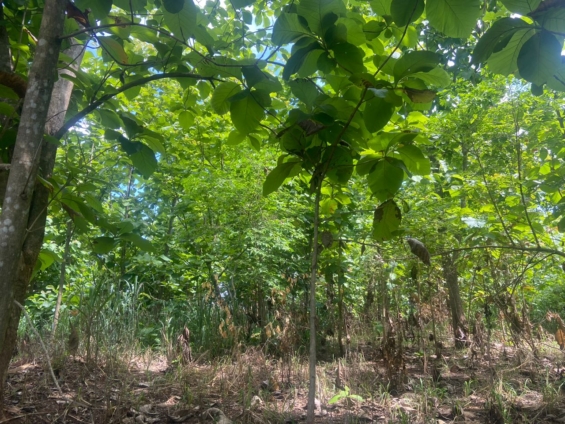New research has said that successfully restoring forests requires a multifaceted approach that addresses climate change, preserves biodiversity, and supports local communities, as prioritising one aspect over others can have unintended negative consequences.
The study by the Universities of Exeter and Oxford reveals that forest restoration plans focused on a single objective often fail to achieve other crucial goals.
However, integrated plans that consider multiple objectives simultaneously can deliver over 80% of the benefits across all three areas, including Climate change mitigation, biodiversity conservation and societal benefits (livelihoods, housing, and energy).
Notably, the study found that socioeconomically disadvantaged groups would benefit disproportionately from this integrated approach, stating the potential for forest restoration to contribute to greater social equity.
“Policymakers need to consider how forest restoration strategies can achieve multiple objectives, accounting for potential tradeoffs and inequity issues,” the study said.
The study published in journal Proceedings of the National Academy of Sciences (PNAS) on August 12, 2024, titled: “Optimizing Restoration: holistic spatial planning to deliver Nature’s Contributions to People with minimal tradeoffs and maximal equity,”states that, the crucial role of forests in mitigating climate change, preserving biodiversity, and supporting local communities. However, the research also reveals that forest restoration efforts inevitably involve trade-offs between environmental and societal outcomes, indicating the need for a balanced and nuanced approach.
The study finds that around 2.5 billion people, or one-third of the global population, reside in areas suitable for forest restoration in the Global South. To achieve successful forest restoration in these regions, prioritizing local community needs is crucial and can be achieved by granting communities’ rights, ensuring their participation in decision-making, and supporting community-led management and governance.
The researchers employed the Nature's Contribution to People (NCP) framework, developed by the Intergovernmental Science-Policy Platform on Biodiversity and Ecosystem Services in 2017. They focused on three key NCPs: Climate change mitigation which assesses forests' role in reducing greenhouse gas emissions; Biodiversity value which examines forests' ability to provide habitats for forest-dependent mammals; and Societal NCP which evaluates the direct benefits of restored forests for human livelihoods, including housing materials and energy. By analyzing these three NCPs, the researchers aimed to understand the complex relationships between forest restoration and its outcomes for both the environment and local communities.
The study applied its findings to a large-scale scenario in India, exploring the benefits of natural regeneration of native forests in suitable areas currently without forest cover.
Restoration projects often have a narrow focus, leading to trade-offs, notes Dr Trisha Gopalakrishna from the University of Exeter. For instance, he says, prioritizing carbon storage might lead to planting specific tree species and restricting access to protect them. Conversely, focusing on biodiversity might also involve managing forests for iconic species like the Bengal tiger or Asiatic elephant. This siloed approach can overlook the interconnected benefits of forest restoration.
“If you focus on human livelihoods, you might plant species that provide housing materials and fuelwood for cooking. The philosophy you choose will dictate your choices. Unsurprisingly, our study shows that plans with one NCP in mind tend not to deliver the others. However, we were surprised and pleased to find that an ‘integrated’ plan can deliver all three remarkably efficiently,” Dr Gopalakrishna.
Latest Stories
-
Central Region schools and CIUCC celebrate United Nations Chinese Language Day
1 hour -
Maiden AshantiFest peaks this Easter weekend, Kumasi residents ready to participate in fun-filled activities
1 hour -
Joseph Nelson tackles potholes on Asem-asa N1 highway on Takoradi-Accra road
2 hours -
W/Regional Minister slams police officers allegedly accepting bribes from illegal miners
2 hours -
UEW expels postgraduate student over massive admission and certificate fraud scheme
2 hours -
GNPC’s EXPLORCO to drill first Voltaian Basin Well in 2026 as Ghana courts energy investors
2 hours -
“We have been caged” – GAFORB urges BoG to reassess forex operational guidelines
2 hours -
The idea is to give everyone a chance in football – CAF rep on African Schools Football Championship
3 hours -
MP Jerry Ahmed Shaib sounds alarm over prolonged ‘dumsor’ in Weija‑Gbawe, demands urgent action
3 hours -
Women and Girls Bleed Too: Shining the Light on haemophilia and bleeding disorders in Women and girls
3 hours -
‘Our galamsey fight is nothing but staged drama until the kingpins are dealt with’ – Prof Boadi
4 hours -
Ramadan Cup: Kudus, Kamaldeen donate trophy, medals and cash prize for 10th edition
4 hours -
Gov’t must act to end banditry and domestic terrorism in Bawku – Mamprugu Overlord
4 hours -
A/R Minister announces plans to relocate Kumasi Central Prisons to help decongest the city
4 hours -
Your jobs are safe – Lands Minister assures Damang Mines workers
5 hours

